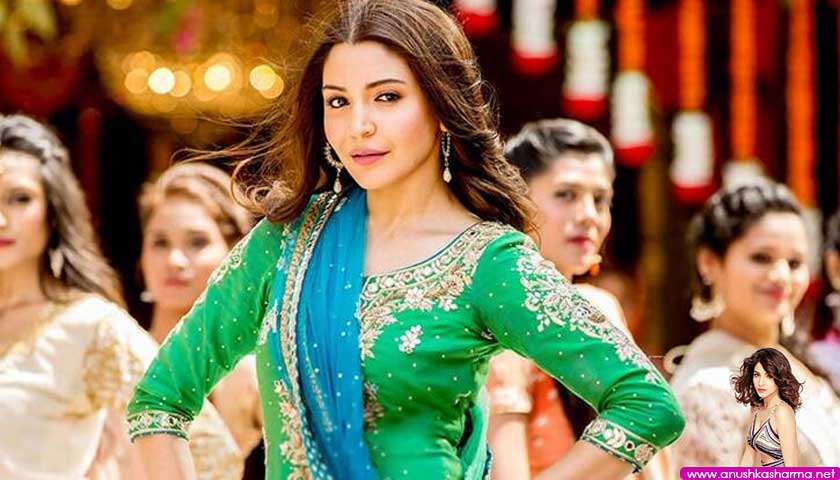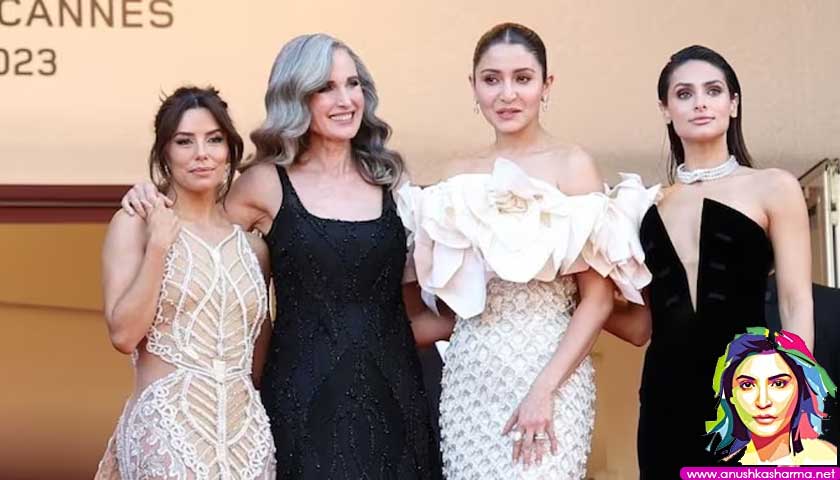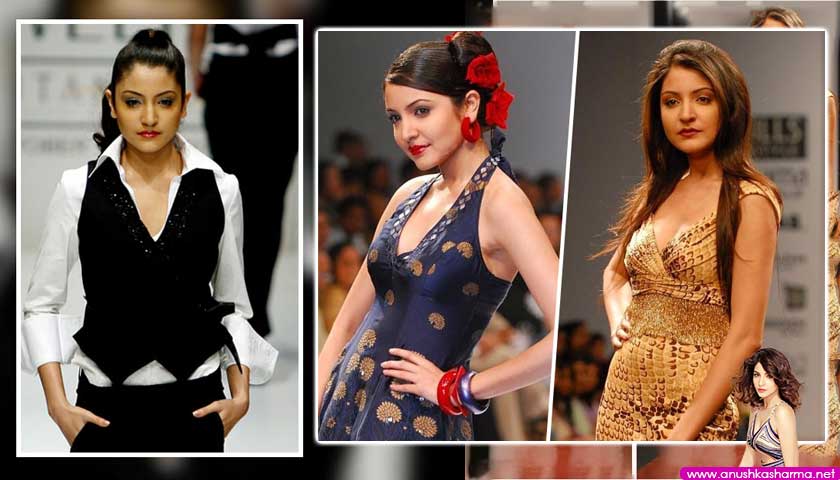Anushka Sharma acting career
Film debut and breakthrough (2008–2013)
Sharma made her acting debut in Aditya Chopra’s romantic drama Rab Ne Bana Di Jodi (2008), opposite Shah Rukh Khan. She took a day to prepare for her screen test at the Yash Raj Films studio and refused to do an impromptu one. She was signed for a three-film deal with the company and landed the leading role of Tani Sahni, a young bride to a middle-aged man, portrayed by Khan. Khalid Mohamed of Hindustan Times found her to be “assured and upright” in the film, but Nikhat Kazmi thought that she “lacks all chutzpah and can barely hold your attention”. The film was a major commercial success, emerging as the second-highest grossing Hindi film of that year, and earned Sharma Filmfare Award nominations for Best Actress and Best Female Debut. Two years later, Sharma played the leading lady in the crime-comedy Badmaash Company, directed by Parmeet Sethi and co-starring Shahid Kapoor, Vir Das and Meiyang Chang. The film, which tells the story of four underachieving friends who begin a scam business enterprise, received mixed reviews.
Later in 2010, Sharma completed her three-film contract with Yash Raj Films by starring in Band Baaja Baaraat, a romantic comedy directed by Maneesh Sharma and co-starring debutant Ranveer Singh. Her role was that of Shruti Kakkar, an ambitious middle-class Punjabi girl who starts her own wedding planning business. In preparation for the part, Sharma learned to speak in the Punjabi dialect, which she cited as the toughest part of her role; she described the way the lead characters in the film interact as “crude but cute” and it required her to “talk fast, sometimes mix words and even omit words completely”. Trade analysts expressed doubt on Band Baaja Baaraat’s financial prospect, citing the middling response to Yash Raj Films’ last few productions, the lack of a male star, and saying that by then Sharma was an “almost-forgotten” actress. However, Band Baaja Baaraat earned positive reviews and emerged as a sleeper hit. Sharma’s performance was praised by critics, many of whom cited it as her best work to that point. The critic Anupama Chopra wrote that Sharma “comes into her own as the ambitious Delhi girl, who dreams of upgrading to multi-crore Sainik Farms weddings”. For her work in the film, Sharma received her second nomination for the Filmfare Award for Best Actress.
Sharma’s first venture not to be produced by Yash Raj Films was the drama Patiala House (2011) directed by Nikkhil Advani and co-starring Akshay Kumar. The film tells the story of a budding cricketer (played by Kumar) who encounters trouble in convincing his father of his profession; Sharma was cast as the love interest of Kumar’s character. Sukanya Verma of Rediff.com praised Sharma’s work and labelled her a “metaphor for energy”. That same year, she re-united with co-star Ranveer Singh and director Maneesh Sharma for the comedy-drama Ladies vs Ricky Bahl. She featured as Ishika Desai, a salesgirl hired to outwit a conman (essayed by Singh), who ends up falling in love with him instead. The film and Sharma’s performance received mixed reviews, with Piyali Dasgupta of NDTV calling her “believable but not endearing”. Despite mixed reviews, the film was a moderate success at the box office.
In 2012, Sharma played a supporting role alongside Shah Rukh Khan and Katrina Kaif in Yash Chopra’s “swan song”, the romance Jab Tak Hai Jaan, which marked her fifth collaboration with Yash Raj Films and her second with Khan. She was cast as Akira Rai, a Discovery Channel reporter who harbours ambitions of being a documentary filmmaker. CNN-IBN’s Rajeev Masand wrote that Sharma “brings a spark to the film”, but Raja Sen disagreed and said that “while Anushka can indeed play spunky, she needed here to tone it down several notches”. For her role, she won the Filmfare Award for Best Supporting Actress. Jab Tak Hai Jaan proved to be the third highest-grossing Bollywood film of 2012.
Sharma next appeared in Vishal Bhardwaj’s Matru Ki Bijlee Ka Mandola (2013), a political satire set in a village in Haryana. Co-starring alongside Pankaj Kapur, Imran Khan and Shabana Azmi, Sharma played the titular role of Bijlee Mandola, a strong-headed girl who engages in a romantic affair with Khan’s character despite being engaged to another man. The film received positive to mixed reviews from critics, and underperformed at the box office. Several critics noted that Sharma was being stereotyped as a loud and loquacious girl; Raja Sen noted that she “is great in a couple of scenes near the climax,” though Kanika Sikka of Daily News and Analysis was more critical and found her “unconvincing”.
Success and expansion into film production (2014–2016)
In 2014, Sharma played a television journalist who befriends an alien (played by Aamir Khan), in Rajkumar Hirani’s religious satire PK. Critic Saibal Chatterjee wrote that Sharma plays “a feisty poetry-loving girl who knows her mind far more than most Hindi film heroines are allowed to” and praised her for “hold[ing] her own” against Khan. Critically acclaimed, PK emerged as the highest-grossing Bollywood film with a worldwide revenue of over ₹7 billion (US$98 million). Sharma launched a production company named Clean Slate Filmz, whose first release was Navdeep Singh’s thriller NH10 (2015), in which she also played the lead role. Screened at the 5th Beijing International Film Festival, it tells the story of a married couple whose lives are endangered after an encounter with a group of criminals. In preparation, Sharma underwent interval training for three months to build her stamina. Saibal Chatterjee found the film to be a “taut and riveting thriller” and praised Sharma for “conveying a range of moods as she moves from the vulnerable to the fearless in a battle in which the odds are stacked heavily against her”, and Prarthana Sarkar of International Business Times credited her for breaking away from her romantic comedy image. The film also emerged as a box office success.
In Anurag Kashyap’s period crime drama Bombay Velvet (2015), (based on the historian Gyan Prakash’s book Mumbai Fables) co-starring Ranbir Kapoor and Karan Johar, Sharma was cast as a jazz singer, Rosie Noronha. Her character was referenced from the actresses Brigitte Bardot, Helen and Waheeda Rehman. To prepare, Sharma watched films of the 1950s and 1960s, and documentaries about hair and make-up. She also used temporary lip enhancers for the part, citing it as the reason behind her changed appearance on a chat show in 2014, and refuted media speculation about having undergone plastic surgery. Bombay Velvet was screened at the Locarno and Bucheon film festivals; critical opinion was mixed. Writing for Business Standard, Ritika Bhatia praised Sharma’s performance in the song “Dhadaam Dhadaam”: “she fills the stage with such raw emotion that her mascara-laden tears and fake eyelashes flutter with arresting passion”. However, the film failed to recoup its ₹1.2 billion (US$17 million) investment. In the same year, Sharma featured in the supporting role of a dancer aboard a cruise ship in Zoya Akhtar’s Dil Dhadakne Do, an ensemble comedy-drama in which she was featured opposite Ranveer Singh. The song sequence “Pehli Baar” was choreographed by her and Singh; Shilpa Jamkhandikar of Reuters praised their on-screen chemistry and described it as “crackling”. Her performances in NH10 and Dil Dhadakne Do earned Sharma Filmfare Award nominations for Best Actress and Best Supporting Actress, respectively.
Sharma next reunited with Yash Raj Films in Sultan (2016), a romantic sports drama from the writer-director Ali Abbas Zafar. She took on the role of Aarfa Hussain, a wrestler from Haryana who inspires the title character (played by Salman Khan) to take up the sport. Sharma was initially hesitant to play the part as she did not have the physique of a wrestler; she researched on different weight categories to “beat people’s perception that all wrestlers are huge.” She trained for six weeks in the sport, learned to speak the Haryanvi dialect, and interacted with female wrestlers from the state. The film and her performance received mixed reviews. Critics were appreciative of her substantial role in an androcentric film; Filmfare’s Rachit Gupta described Sharma as “the best thing in the film” and noted that “[e]ven though she doesn’t have the physique of a wrestler, her spirited performance makes you believe in her tough but emotional character.” However, Suprateek Chatterjee of The Huffington Post felt that she was unconvincing as a wrestler, writing that “she possesses literally zero muscles and somehow always finds the time to get her make-up just right.” With earnings of over ₹5 billion (US$70 million) worldwide, Sultan ranks among Indian cinema’s biggest grossers.
Sharma achieved further success later that year when she played the lead female role of Alizeh Khan, a free-spirited girl in a loveless relationship in Karan Johar’s romantic drama Ae Dil Hai Mushkil, alongside Ranbir Kapoor and Aishwarya Rai. Mike Maccahil of The Guardian took note of how much Sharma “terrific spikiness” and her chemistry with Kapoor helped a mediocre picture. In another typical mixed review, Sweta Kaushal of Hindustan Times praised Sharma’s empowered female lead. The film earned over ₹2 billion (US$28 million) worldwide, and Sharma received a Best Actress nomination at the 62nd Filmfare Awards. With two top-grossing films in 2016, Bollywood Hungama ranked Sharma as the most successful Bollywood actress of the year.
Career fluctuations and further production ventures (2017–present)
The 2017 fantasy comedy Phillauri, co-starring Suraj Sharma and Diljit Dosanjh, featured Sharma as a friendly ghost who wants to reunite with her lover. In addition to acting and producing, Sharma also sang a song in it. She next collaborated with Shah Rukh Khan for the third time in Imtiaz Ali’s Jab Harry Met Sejal, a romance about a Gujrati tourist (Sharma) in Europe who falls in love with her tour guide. Commenting on Sharma’s performances in Phillauri and Jab Harry Met Sejal, Uday Bhatia of Mint praised her ability for “straight-faced com[edy]”. Bhatia, however, criticised her pairing with Khan, 22 years her senior, in the latter film. Unlike her 2016 releases, both these films were box office flops.
Sharma’s first film release of 2018 was the horror film Pari, which she starred in and produced. It tells the story of Rukhsana (Sharma), a battered young woman living in the wilderness, who is rescued by a benevolent man (played by Parambrata Chatterjee). Though Shubhra Gupta of The Indian Express found the film “scatter-brained” and added that “nothing can rescue it, not even a leading lady who is determined to do something different with her producing heft”, Sukanya Verma featured her performance in Rediff.com’s annual list of best actresses, writing, “going from unhinged to ghastly to mesmeric, here’s an actress who’s game for everything.” It earned ₹400 million (US$5.6 million) worldwide against a production budget of ₹180 million (US$2.5 million). Sharma next played a biographer documenting the life of the troubled actor Sanjay Dutt in Rajkumar Hirani’s biopic Sanju, starring Ranbir Kapoor in the title role. Rajeev Masand commended the film’s ensemble but was critical of Sharma’s performance, writing that she “sticks out with strange hair and stranger accent”. Even so, it emerged as her third release to earn over ₹5 billion (US$70 million) worldwide.
In the same year, Sharma teamed with Yash Raj Films for the eighth time in Sui Dhaaga, a comedy-drama co-starring Varun Dhawan, about a poor, young couple who begin their own small-scale clothing industry. Ronak Kotecha of The Times of India praised the subtle chemistry between the leads and credited Sharma for playing the restrained role effortlessly. She received a nomination for the Filmfare Critics Award for Best Actress. Sharma’s final film appearance of the year was in Zero, a drama about a dwarf’s romantic tribulations involving two women, which reunited her with Shah Rukh Khan and Katrina Kaif. She played a NASA scientist suffering from cerebral palsy, for which she met with an occupational therapist and an audiologist; she also stayed in character and chose to use a wheelchair between shots. Anupama Chopra considered her portrayal of the condition to be “inconsistent and clumsy” but Namrata Joshi of The Hindu found her “earnest and invested”. As with her previous collaboration with Khan, Zero was a commercial failure.
In 2020, Sharma served as executive producer for her company’s crime thriller series Paatal Lok, which was released on Amazon Prime Video, and produced the horror film Bulbbul for Netflix. Anna M. M. Vetticad found recurring themes of “feminism and the paranormal” in several of her company’s projects, and credited Sharma for her “courageous, non-conformist” choices as a producer. She will next produce the drama series Mai about a middle-aged housewife fighting crime for Netflix.




